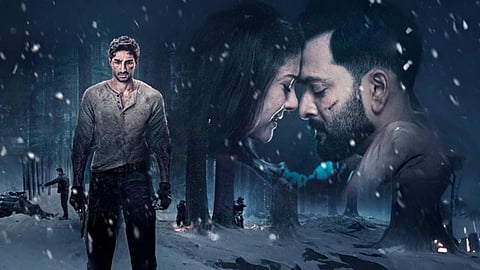Sarzameen Movie Review: Where patriotic action meets worst of Dharma’s emotional excess
Sarzameen(1.5 / 5)
Sarzameen Movie Review:
What if Kabhi Khushi Kabhie Gham (2001) was an Animal-coded war-film set in Kashmir? That’s how Sarzameen takes shape. It features a son yearning for the love of his father who finds him rather weak. Col. Vijay Menon (Prithviraj Sukumaran) is a dedicated army-officer and a ruthless father, who isn’t quite proud of Harman (Ibrahim Ali Khan), his underconfident, stuttering son. Stationed in Kashmir, Vijay is willing to take an extra mile to fight with militants, not thinking even of his son’s safety when it comes to protecting his land. He excels in resolving country issues but remains a failure in dealing with his daddy issues. And so, the son turns bitter, taking arms against his own father. But there are more tears shed than blood, more sentiments exchanged than bullets. Generational trauma is resolved before battle wounds are healed. It is about family after all. This is a Dharma film.
Kajol plays the melodramatic mother, trying to convince Vijay to think of his son before anything. Vijay’s adamant proclamation, “Sarzameen ki salamati se badhkar mere liye kuch bhi nahi, chahe wo mera beta hi kyun na ho (Nothing is more important to me than protecting my motherland, not even my son)” finds an equally dramatic counter when she says, “Is duniya me apno ke khoon se badhkar kuch nahi hai (There is nothing more important in this world than your loved ones)”. The film hovers around these contrasting thoughts, becoming an almost philosophical exercise in deciding what is right and wrong. However, it is not as self-aware to stand apart, not as profound to leave an impact.
Starring: Prithviraj Sukumaran, Ibrahim Ali Khan and Kajol
Directed by: Kayoze Irani
Streamer: JioHotstar
At times, it starts becoming so absurd that it seems allegorical. After a point, the only way I could make sense of it was thinking of it as a father-son conflict mirroring the turbulent relationship of the Indian state with Kashmir. Is it trying to be silently radical? There are strong signs of it everywhere. When Harman disappears and comes back home after eight years, Vijay eyes him with suspicion and is later filled with regret as he realises that it is really Harman and not an imposter. Vijay opens up to his junior, Iqbal Ahmed (Jitendra Joshi), saying, “I don’t know what to say to him. Where to start?”. Iqbal responds, “Everything starts with an apology.” The dialogues carry a sense of saying just one thing but meaning something more. Yet, the room for allegory dies for the film doesn’t seem to be as smart. I realised sooner that it isn’t trying to be silently radical. It is just loudly ignorant.
Debutant director Kayoze Irani makes everything a tad too preachy, simplistic and scattered. The background of Kashmir is used merely to serve the tacky family dynamics and present a pleasing visual aesthetic. It is bereft of any resonance to reality or even logic. Harman turning into a militant just to take revenge on his father feels rather extreme. What about the complex geo-politics of the region? What makes a person take arms against the state? According to the film, a father’s inattentiveness and indifference are enough. Prithviraj plays Vijay with an awkward touch. The Hindi dialogues coming with an accent from his mouth don’t feel as natural and take away the potency of moments. Kajol maintains her A-game but there is little that the film gives her to do barring an outrageous twist in the climax. Ibrahim stays believable too, coming right after the embarrassment of his debut. He still lacks the charisma and a strong on-screen presence. There are rough edges in his performance but he feels more in-tune to the character than the forced presence in Nadaaniyan.
The actor kickstarted his Bollywood journey with two Dharma films—both entirely different in tone but almost similar in tiring the viewers. Nadaaniyan walked in the shadows of the Kuch Kuch Hota Hai (1998) brand of romance, presenting a lifeless, bland experience, while Sarzameen creates a new genre: the patriotic family drama. While the film steers away from jingoism, it makes up for that with a hyper-emotional outburst every now and then. Instead of a country reigning supreme, it is the father-son bond here that explodes. Like Rahul Raichand from K3G, the son here won’t continue to respect his father even after being ousted. He won’t even wait for his father’s acceptance while wrecking-havoc like Ranvijay in Animal. Rather, the son will take training from across the border, plan a terrorist attack after being brainwashed and come back to eliminate his father. If that is really an allegory, it is too obscure and pointless to ever hit as one, reducing a decades-long conflict to a dinner table spat. Because who needs complex geopolitics when unresolved daddy issues are enough to trigger insurgency?

